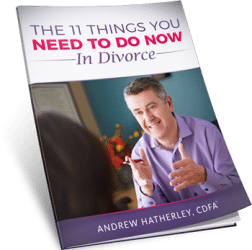WOMEN IN DIVORCE
Women in Transition – Finding Meaning After Divorce

Andrew Hatherley, CDFA®
April 18, 2019
The focus of my divorce practice has expanded beyond helping my clients get through the financial issues of their divorce.
I have come to believe that an equally important goal of any divorce financial professional should be to prepare (dare I use the word inspire) the divorcing client for success after divorce. This guiding thought has carried through to the clients I work with on the financial advisory side of my business as well: women in transition such as retirement and widowhood.
In this article, I’ll review some of the more common ways divorcing women in transition assistance is done in the CDFA® world— the money side of the equation—but I’ll also shine a light on the human side. I’ll discuss how we can add value by focusing on helping our clients find meaning in their lives; a sense of purpose that will drive them forward, supported by the financial foundations we have helped them lay.

We can add value by focusing on helping our clients find meaning in their lives; a sense of purpose that will drive them forward, supported by the financial foundations we have helped them lay.

We can add value by focusing on helping our women in transition clients find meaning in their lives; a sense of purpose that will drive them forward, supported by the financial foundations we have helped them lay.
Like many CDFA® professionals, I went through a difficult divorce. After nine long months and more tens of thousands of dollars than I care to discuss, I was relieved (if not a little shell-shocked) when it all ended in June 2015. Emerging from the battlefield, I determined to earn the CDFA® designation and to make divorce financial planning a key component of my financial advisory practice.
Beginning with private strategy sessions and monthly workshops, my mission would be to help others avoid the mistakes I made in divorce and to educate people, with the help of attorneys and therapists, not only on the financial aspects of divorce but also on the legal and emotional realms. I knew from my own experience that divorcing people are most likely to make self-sabotaging moves— to let emotion dictate logic—when in the throes of an impactful life transition.
I realized early on in my workshops that what resonated most when I communicated with participants was the idea that while going through divorce can be so terrifying emotionally that one imagines all sorts of disastrous outcomes, the worst rarely comes to pass. Once again, this was confirmed to me by my own personal experience. The emotional and financial toll was great. But emerging from this difficult transition led to a fulfilling journey. I, like any other survivor of divorce, was emerging from a situation that was not right for me. Now I had the opportunity to reset my life on a new, purposeful course.
“Recent studies have shown that the average woman’s income falls by more than a fifth after divorce and that the financial consequences of divorce can be a challenge for the rest of her life.”
Six months after my divorce, I determined to pick myself up and face the world. 2016 would turn out to be one of the most productive years of my life: physically, professionally and creatively. I lost fifteen pounds, finished a novel and left my broker-dealer to happily enter the independent RIA world. And the momentum continues to this day.
What Does a Divorce Transition Practice Look Like?
We all know the valuable service CDFA® professionals provide as we help our women in transition clients through divorce. Acting as financial neutrals, we help couples avoid the emotional and financial stress of litigated conflict. As advocates on a client’s divorce team, we provide financial expertise, exhibits and even expert witness testimony. In many ways, our work plays a valuable role in making the divorce process clearer, fairer and less stressful, both economically and emotionally.
As CDFA® professionals, we understand the value of our work at its core. We focus on the “financial” in CDFA® —and for good reason.
Post-Divorce Transition Assistance
As financial professionals, we are trained to plan for the future, to encourage our clients to look at the long term. Many of our divorcing clients are stuck in the present or perhaps dangerously reliving the past and can’t see how their divorce settlement will play out over the next twenty years. In the January 2017 issue of the DFA Journal, Adrienne Rothstein Grace identified six key areas in which CDFA®s can help with post-divorce financial planning:
- Help Safeguard Their Settlement. Work with clients to stick with long term plans for their settlement.
- Expense Planning. Assure that the settlement accounts for future changes in expenses.
- Investment Issues. Reassess risk in transition.
- Hands-on Support. QDROs, IRA Transfers, Stock Options, Pensions.
- Income Issues. Alimony: for how long? Child Support?
- Insurance Issues. Health, Life, Property/Casualty, Long-term Care, Disability.
“It may be necessary to wait some time if child support arrangements, new jobs or other concerns may impact an individual’s future permanent location.”
Financial Transition Coaching
It is common for the female partner to find herself at sea when it comes to budgeting, particularly when emerging from a relationship with a controlling personality. Recently, I worked with a woman whose husband was very secretive about family finances—secretive but incompetent. She was a housewife for the duration of their marriage while he kept her in the dark on the family finances. She knew that their monthly expenses were high but assumed that his substantial salary would cover everything. Despite his high income, during the great recession his financial mismanagement led them to bankruptcy.
I knew she was a prime candidate for financial coaching and decided to make her my first financial coaching client. My practice has since evolved to include various levels of coaching, from short strategy sessions to more in-depth six month programs.
Financial coaching may include the following:
- Getting Financially Organized
- Setting Action Steps
- Identifying Money Obstacles
- Insurance
- Budgeting
- Debt Management
- Education Planning
- Home Purchases
- Automobile Purchase/Lease
- Dealing with Credit Cards
Helping Clients Find Their Purpose
As I noted earlier, focusing solely on money runs the risk of missing the key human element in serving our clients. That human element is meaning. Meaning, or having a purpose, gives us a reason to get out of bed in the morning. It drives us forward. Money should be considered not an end in itself (or a magic number) but a vehicle to fund that purpose. To that end, I encourage CDFA® professionals to consider our clients’ lives beyond the money.
Increasingly, our collective consciousness is awakening to the fact that happiness is transitory, it is not a state of mind. We may be happy with a new car, a beach vacation or even a delicious meal, but all these episodes produce diminishing returns.
Dr. Jordan Peterson, a clinical psychologist and the author of the bestselling book, 12 Rules for Life, writes that because of the intrinsic difficulty of life, it is necessary to find something that is truly engaging and meaningful. Otherwise life can make you bitter, angry and cruel. Peterson cites Viktor Frankl, author of the famous book Man’s Search for Meaning.
Frankl’s wife, mother and brother were murdered in Nazi concentration camps. He survived that horror and, based on his experiences and those of other prisoners, he determined that people are primarily driven by a “striving to find meaning in one’s life.” This sense of meaning enables people to overcome the most painful experiences.

Based on his experiences and those of other prisoners, he determined that people are primarily driven by a “striving to find meaning in one’s life.” This sense of meaning enables people to overcome the most painful experiences.

Based on his experiences and those of other prisoners, he determined that people are primarily driven by a “striving to find meaning in one’s life.” This sense of meaning enables people to overcome the most painful experiences.
Depending on the client’s situation, I might refer her to a trusted life coach or therapist. Typically, I will introduce the client to materials I have gathered in my own quest to find meaning following my divorce. In this, I have incorporated the work of Peterson and Simon Sinek. Sinek is famous for his TED Talks, but his book Find Your Why offers a practical approach to finding fulfillment in the work we do. Through detailed exercises, illustrations and action steps we find a practical way to connect our work to our sense of purpose and thus discover our “why.”
Peterson’s 12 Rules has been a big help to my post-divorce transition, particularly his Rule 8: Tell the truth; and Rule 4: Compare yourself to who you were yesterday, not to who someone else is today. Like Sinek, Peterson also offers practical exercises to lead people toward self-discovery through his self-authoring suite and understandmyself.com.
I have also incorporated tools I use to coach my retiree clients into my divorce practice. I have found the work of Mitch Anthony, author of The New Retirementality, to be particularly useful. Anthony, similar to Sinek and Peterson, has developed client exercises which focus on Return on Life, which he defines as “How well you are doing in living the life you want with the money you have.” Once again, he emphasizes working with clients on the human side in addition to the financial side of the equation.
I have found a symbiosis between my retirement practice and my divorce practice in presenting the return-on-life approach. Consider the issue of gray divorce. While divorce is becoming less common for younger adults, among U.S. adults ages 50 and older, the divorce rate has roughly doubled since the 1990s. Among those aged 65 and older, the divorce rate has nearly tripled!
“Imagine, as a divorce professional, potentially preventing divorce by having clients focus on finding meaning in their work or their retirement before they take the leap.”
While the reasons for this are varied, one thing I have noticed with my retiree clients is the increased marital stress that can happen when a lifetime worker quits cold turkey once some magical date or age or savings amount has been reached. Unfortunately, the old retirement mentality teaches us this very approach. But it doesn’t consider what the retiree is retiring to! How much golf can one play before it becomes a chore? How much time can you spend on the beach before it becomes routine? What happens when the unhappy retiree is suddenly hanging around the house all day, getting underfoot?
Imagine, as a divorce professional, potentially preventing divorce by having clients focus on finding meaning in their work or their retirement before they take the leap. They need to ask themselves some crucial questions—to discover their why—before they enter the gray divorce danger zone.
I am convinced that people who take the time to look deep within themselves to find meaning in their work or activities inspire those around them. And I believe that the greatest gift that humans can give to one another is to inspire someone.
When divorce financial advisors incorporate the concept of meaning into our client relationships, we add tremendous value to those relationships, enhance the value of our practices, go beyond the trend toward commoditization (if we manage assets), generate tremendous client loyalty and referrals, and distinguish ourselves in carving out a very special niche for women in transition in the divorce world.
Want new articles before they get published?
Subscribe here.
Healing Through Creativity After Gray Divorce
Gray divorce, the term used to describe the increasing trend of divorces among couples over the age of 50, can be a challenging and transformative life event. After the dust settles, many individuals find solace and personal growth through various forms of creativity....
The Importance of Access to Money Early in the Divorce Process
One aspect that often plays a critical role in ensuring a fair and equitable outcome is having access to financial resources early in the process. In this blog post, I want to emphasize the importance of securing financial stability during a divorce and the advantages...
Collaborative Divorce Law: Resolving Disputes with Dignity and Cooperation
Divorce is often associated with conflict, animosity, and lengthy court battles. However, there is a growing alternative to traditional divorce litigation that aims to reduce hostility and promote amicable resolutions: Collaborative Divorce Law. In this blog post, we...


Wiser Divorce Solutions
Certified Divorce Financial Analyst (CDFA®), Andrew Hatherley can help you to reach a workable resolution to your divorce so that you can get on with your new life and get started on your dreams.
Additional Resources
Contact Us
Office Hours: M-F, 9am-5pm
Call Us: (702) 835-6960
Directions: Map It
Andrew Hatherley is NOT AN ATTORNEY AND DOES NOT PROVIDE LEGAL ADVICE. All information he provides is financial in nature and should not be construed or relied upon as legal or tax advice. Individuals seeking legal or tax advice should solicit the counsel of competent legal or tax professionals knowledgeable about the divorce laws in their own geographical areas. Divorce planning is a fee-only process that does not involve investment advice or securities or insurance transactions.
Copyright © 2020 Wiser Divorce Solutions. All Rights Reserved. Site Managed by Sarah Brumley Marketing.




